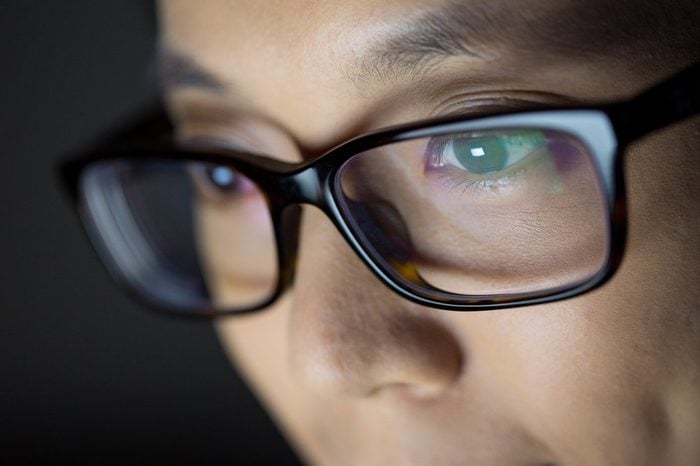
Are blue light glasses helpful?
You probably spend what seems like a tremendous amount of time staring at digital screens on your phone, computer, or tablet. While that’s a nearly unavoidable fact of daily life, these electronic devices do emit a specific type of light called blue light. How that might affect your brain, eyes, and body is still being studied. It’s thought to be able to disrupt your sleep, while it’s less clear on how it may contribute to other problems such as headaches and dry eyes.
In the meantime, a number of companies including Warby Parker and Felix Gray, have developed blue light-blocking glasses to protect the eyes from the light coming from all screens, including your phone, computer, and tablet.
So, are blue light glasses helpful or are they just hype? Here’s the science behind the specs.
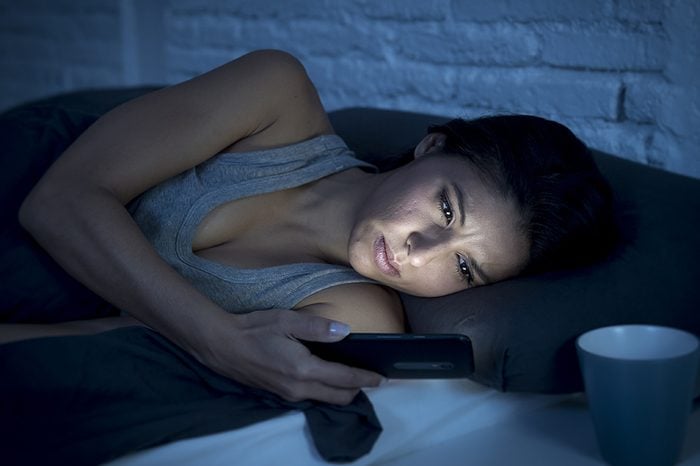
What is blue light?
To understand how blue light glasses work, first, you need to know where blue light comes from. Think of the light spectrum, where the range is from red to violet. “Light is radiant energy, which comes in all the colours of the rainbow, from red through orange, yellow, green, blue, and violet, depending on the wavelength of the radiation,” explains Scott E. Brodie, MD, PhD, an ophthalmologist at NYU Langone in New York City. “When all the colours are mixed together, we see the light as ‘white.’ Blue light lies near the short-wavelength end of the spectrum.”
Any hot, radiant object emits blue light, including things like the sun, incandescent bulbs, as well as most fluorescent and LED light sources, explains Dr. Brodie. That means that you’re not only getting blue light from the sunlight outside, but it also comes from all electronic screens, including phones, tablets, computers, and televisions.
(Psst: This treatment can help prevent the tension headache you get from staring at your computer all day.)
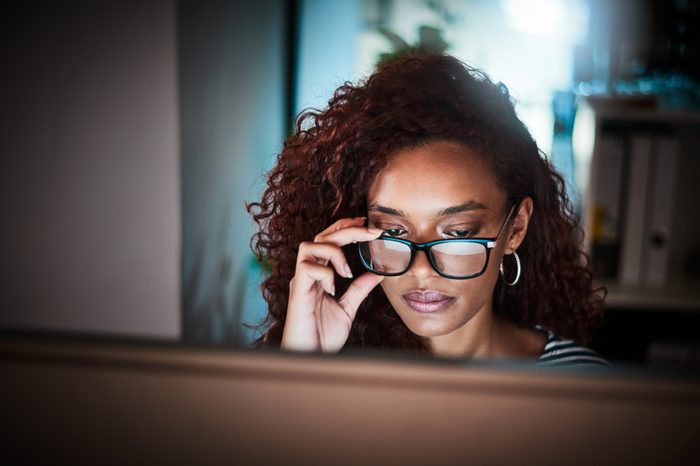
Screen time and blue light
The amount of time you spend in front of a screen, at work or at home, can lead to several issues, like digital eye strain. But it’s not clear that blue light is to blame. According to the American Optometric Association, this is “a group of eye- and vision-related problems that result from prolonged computer, tablet, e-reader and cell phone use.” While it’s true that the more you stare at a screen, the greater your blue light exposure, that doesn’t mean that blue light is responsible for eye strain—or that blocking it with a special pair of glasses will prevent it.
Yuna Rapoport, MD, MPH, founder of Manhattan Eye, and an assistant clinical professor of ophthalmology at Mount Sinai in New York City, explains that it’s not necessarily blue light, but screen time itself that is the issue. “Anytime we are focused on a screen, the amount we blink, and the completeness of our blink is diminished.” A normal “blink rate” is about 15 times a minute, says Dr. Rapoport, but this rate is cut in half when we look at screens like our phones, tablets, computers, or TVs.
“This leads to drying out of the cornea, a poor tear film surface, and symptoms such as feeling like there is something in our eyes, irritation, tearing, and blurry and fluctuating vision,” says Dr. Rapoport.
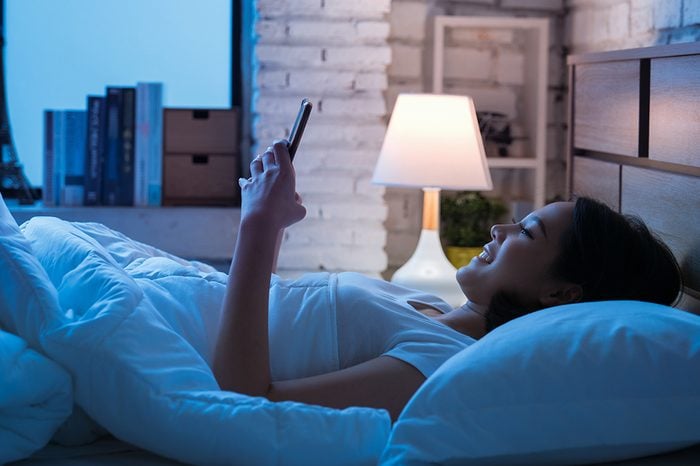
How blue light affects sleep
As previously mentioned, you should still try to limit your exposure to blue light at the end of the day—by reducing screen time, not necessarily with special glasses—because it’s thought to negatively impact your sleep. Blue light can be problematic because it can keep you alert and delay the release of melatonin, the sleep hormone that helps signal when it’s time for bed. According to the National Sleep Foundation, this means exposure to blue light at night may increase the body’s alertness and reset the body’s internal clock, or circadian rhythm to a later schedule. The result? Poor sleep. (Here’s how blue light is affecting your overall health.)
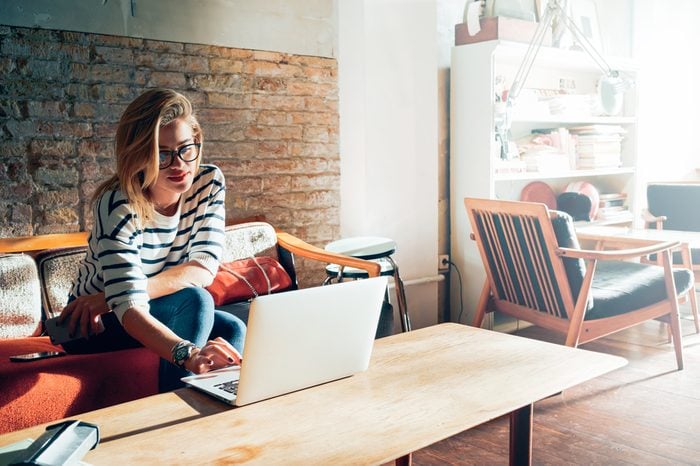
Eyewear for the digital age
Blue light-blocking glasses do serve as a shield to block blue light from digital devices. These glasses have filters in their lenses, explains Dr. Rapoport, that supposedly block the blue light from getting through to your eyes. The theory is that by wearing them, especially at night, you may be able to reduce the quantity of blue light exposure. In turn, makers of blue light glasses say it could allow you to sleep better, but that has not been proven. Some makers of blue light glasses also say they help reduce eye strain, but that’s also debatable.
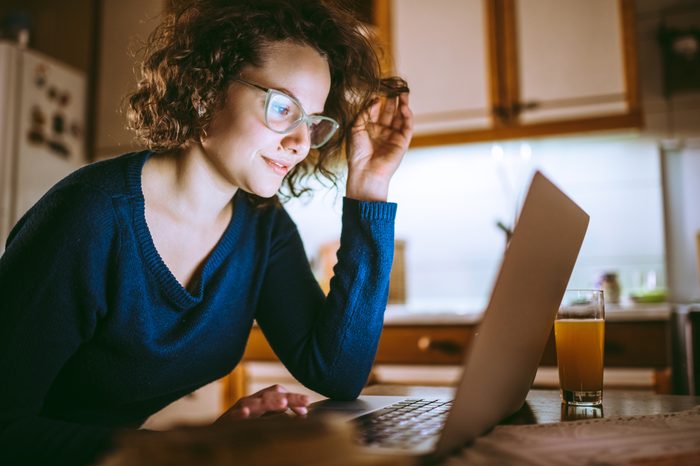
Blue light glasses: The verdict
So, now the real question when it comes to blue light-filtering glasses: Can these lenses stop blue light from affecting your eye health in general? Well, the evidence is lacking.
“This is a misnomer—to my knowledge, the glasses one hears of are ‘blue-blocking’ glasses, which reduce the relative blue light content of ambient light,” says Dr. Brodie. “While there are no known safety risks associated with blue-blocking glasses, I am not aware of health benefits attributed to glasses, which selectively transmit blue light.”
The science seems to agree. A 2017 review in the journal Ophthalmic & Physiological Optics, which includes three studies with 136 participants, suggests there is no high-quality evidence that supports the use of blue light glasses for reducing the effects of issues related to screen use. In the general population, the glasses did not improve visual performance (or sleep quality, for that matter), alleviate eye fatigue, or conserve macular health.
The American Academy of Ophthalmology (AAO) adds that the evidence is limited and it does not recommend any special kind of eyewear for screen use. They also note that the blue light from digital devices does not lead to eye disease like cataracts or macular degeneration. (Unlike ultraviolet light from the sun, which is known to cause eye diseases, so protect those peepers with the right sunglasses.) Common complaints from screen use, like eye strain and dry eyes, is due to the overuse of digital devices in general, not something that’s emitted by them, the Academy adds.
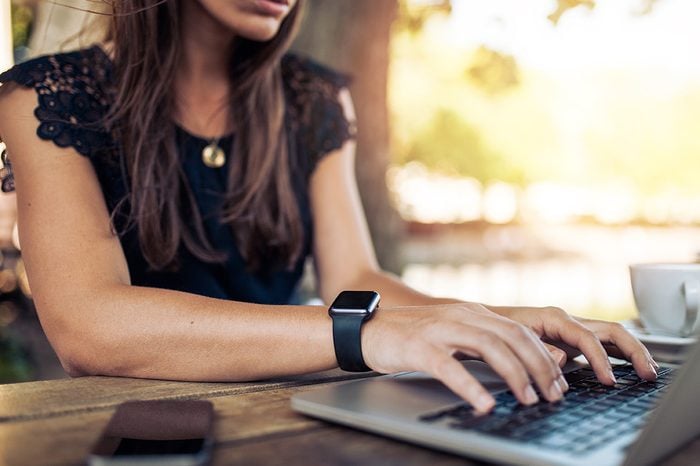
Protect yourself from blue light
The reality is most people can’t avoid spending a lot of time in front of a screen on a regular basis. We rely on digital screens for work, shopping, and keeping in touch with friends and family. Therefore, the AAO offers the following recommendations to lessen any possible concerns from the use of digital devices:
- Try to sit about 25 inches or an arm’s length from the screen.
- Position the screen so you are looking slightly downward.
- Use a matte screen filter if needed to reduce glare.
- Adjust the room’s lighting to reduce eye strain.
- Take regular breaks from staring at the screen.
- Use the “20-20-20” rule: Every 20 minutes look at something 20 feet away for at least 20 seconds.
- Use artificial tears to moisten your eyes if they are feeling dry.
- You may be able to reduce eye strain by upping the contrast on your screen.
- Wear your glasses to give your eyes a break if you wear contact lenses.
Want to lessen the effects of blue light in the evening? For best sleep practices, the National Sleep Foundation recommends powering down any and all electronics at least an hour or two before bedtime and opt for dim, red lighting (if you can) as it has a higher wavelength and doesn’t suppress melatonin.
Next, don’t forget to check out these soothing yoga poses for a better night’s sleep.
